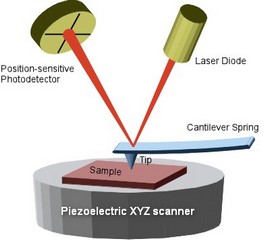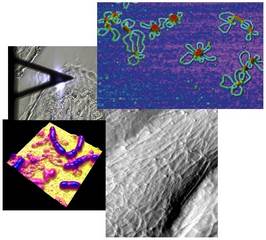The AFM lab
The AFM Lab is fully equipped for all types of ambient AFM measurements on samples ranging from live cells to biopolymers and metal alloys. Special focus is placed on newly developed quantitative dynamic techniques.

By scanning a nm-sharp tip attached to a cantilever spring across a sample surface, atomic force microscopy (AFM) generates quantitative maps of topography and surface properties. The force acting on the spring is measured using an optical detection system.
- As tip-surface force is used as the feedback to for the 3-D topography, there is no requirement to coat or label the surface or material, often needed in alternative techniques (e.g. electron microscopy and fluorescence microscopy).
AFM provides:

- quantitative surface profiles in 3-dimensions
- scale from molecules right up to 100's of micrometers
- unique information on structure and properties of surfaces, materials and objects
- ability to measure in air without requirement for sample preparation, vacuum etc.
- flexibility to measure in various ambient environments, including other gases, humidities and liquid environments
- access to measurements within life science, from structure of individual biomolecules to live cell stiffness and adhesion
- access to nanoscale electrical and magnetic properties such as potential, current, resistance and capacitance because the tip is at, or very close to the surface
